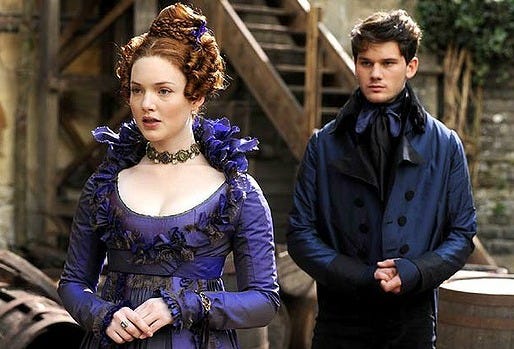Great Expectations

Film adaptations of 19th-century British and American literature have a tendency to be stiff and remote. The characters in those books were often more like archetypes than flesh-and-blood creatures. They spoke in lilted sentences adored in upper-class salons of the day but which were unlikely to actually spill out of anyone’s mouth extemporaneously. Movie versions tend to translate this distance between author and audience.
At first, I thought “Great Expectations” — based on Charles Dickens’ classic tale of a blacksmith’s apprentice transformed into a young gentleman — was falling into this fold. The early section where we’re introduced to the main players and set the plot in motion drags rather badly. Pip is plucked out of obscurity and given a sizeable fortune by a mysterious benefactor.
But something happens along the way. The actors grow comfortable in their roles, director Mike Newell and screenwriter David Nicholls trim away some of the book’s extraneous subplots and characters, and the movie actually grows deeper and richer the further we travel along with it.
By the end, I was fully caught up in the emotional journey of Pip (Jeremy Irvine) and his long-estranged lady love, Estella (Holliday Grainger). Their on-again, off-again affair is somehow both restrained and ravishing.
The cast is just spectacular, with the characters really popping off the screen despite many of them having limited screen time. Jason Flemyng has a sort of shy, proud grace as Joe, Pip’s brother-in-law and passive protector. Robbie Coltrane is a fearsome, fulsome presence as Jaggers, the mercenary lawyer put in charge of introducing Pip into society. Ewen Bremner, Sally Hawkins and Olly Alexander are spot-on as, respectively, Jaggers’ assistant, Wemmick; Pip’s abusive older sister; and best chum Herbert Pocket.
The real standouts are Helena Bonham Carter and Ralph Fiennes, both of whom deserve consideration when the award season rolls in.
As Miss Havisham, the wealthy spinster who takes young Pip under her wing, Carter is an eerie presence, a victim and victimizer who has shut herself away from life. Abandoned at the altar by a conniving embezzler, she still wears her wedding dress, now reduced to ragged strips, while the mice make a feast on her never-served banquet dinner. She’s both vile and pitiable.
It’s no secret Fiennes can be utterly unnerving onscreen, so his early scenes as escaped convict Abel Magwitch are fraught with terror. Later, while never losing his hard edges — he’s a willing murderer who sleeps with a blade in his hand — Magwitch is also exposed as more human than we might have supposed.
Irvine is fine in the lead role, though it’s more of a reactive part where the actor is required to play off of the other, more interesting people around him. Grainger has a nice feel for the coldness inside the heart of Estella, Miss Havisham’s adoptive daughter.
She delivers perhaps the most memorable line of the book and movie: “I have been bent and broken, but — I hope — into a better shape.” This surprisingly touching version of “Great Expectations” certainly breaks the mold for this sort of literary adaptation, breathing life into those dusty pages.
4.5 Yaps



